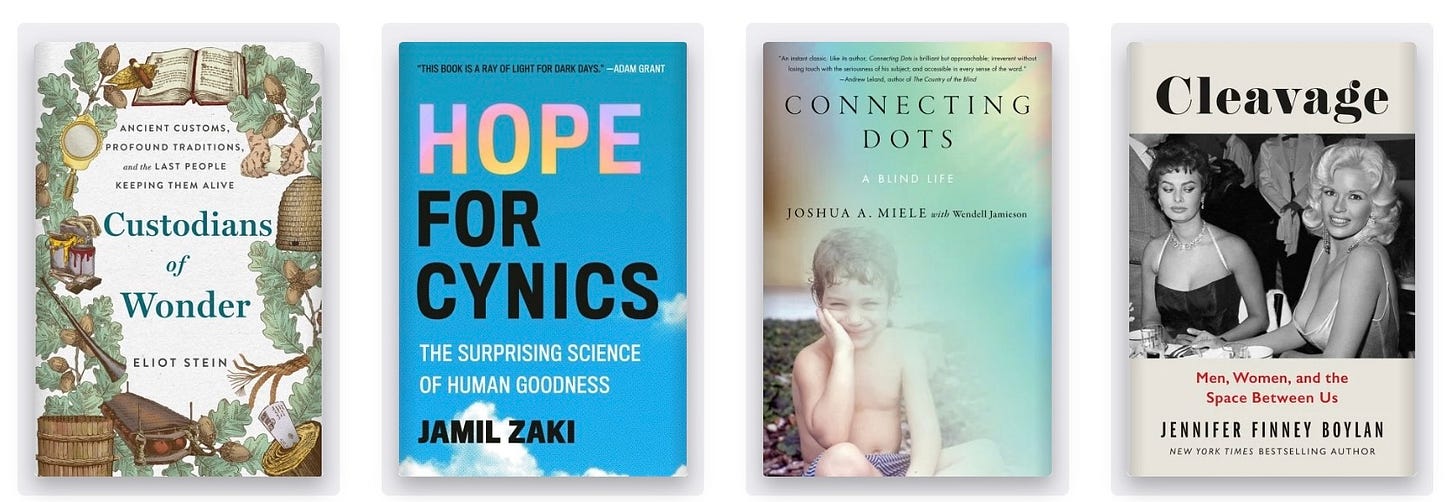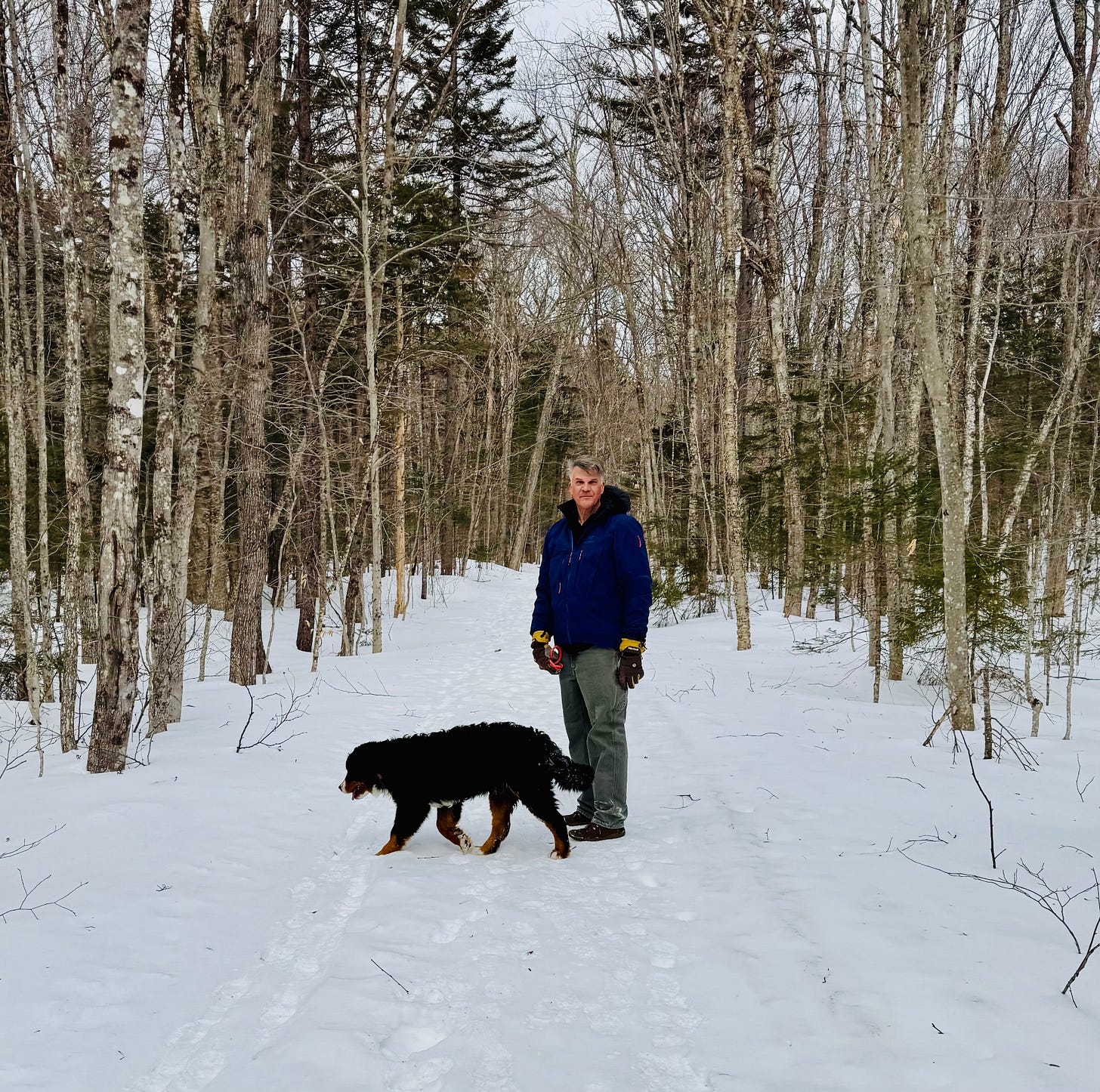These past two months have been strange and difficult for many of us, and it’s hard to feel good about our political situation, or our country, right now. Each day brings an astonishing cascade of bad news, odd news, and seemingly un-thought-out policy decisions. So, I’ve been reading, as I always do. But right now I’m looking for comfort.
Today’s books aren’t my all-time favorites, or my favorite authors (no Ann Patchett, Elizabeth Strout, Colm Toibin, or Emily St. John Mandel here). Instead, it’s an idiosyncratic list of books that have been asserting themselves in my mind lately. And scroll down for guest picks from poet Marjorie Dybec.
Newish comfort reads
Show Don’t Tell, Curtis Sittenfeld (short stories)
In Show Don’t Tell, Curtis Sittenfeld (Prep, Romantic Comedy) mines midlife—the cringey moments and also the unexpected shifts in perspective. “One of the surprises of adulthood for me has been that, as the years pass, it has become less rather than more clear to me whether I’m a good or bad person,” a character muses, in “Giraffe and Flamingo.” Show Don’t Tell’s stories are dryly funny and occasionally heartbreaking, a satisfying report from the front lines of middle age.
Time of the Child, Niall Williams (novel)
A follow-up to Williams’ wonderful novel This is Happiness. Time of the Child is set in the same Irish village as This is Happiness, in the early 1960s. This one focuses on minor characters from This is Happiness, Dr. Jack Troy and his daughter Ronnie. The premise: it’s Advent, and a baby is left on the Troys’ doorstep, turning their lives upside down.
Mothers and Sons, Adam Haslett (novel)
In Mothers and Sons, main character Peter Fischer, a gay immigration lawyer in his forties, is haunted by a secret he carries from his teen years. His mother, Ann, left behind her life as an Episcopal priest to build a women’s retreat center in Vermont. Their struggle to reconnect after years of estrangement unfolds as a closely observed character study. This one may not sound like a comfort read, exactly, but it’s also a novel about forgiveness and self-forgiveness. For more Adam Haslett, here’s my recent interview with him.
The Radio Hour, Victoria Purman (novel)
It’s 1953, and Martha Berry is 50 years old, a longtime secretary at ABC (Australia’s national radio network) who knows her place. But when she’s assigned to work with a young, smug jackass who’s supposed to create a new radio drama, Martha is forced to change. A gentle, funny story about women making room for themselves in a man’s world. Although The Radio Hour’s villains (overconfident, incompetent men) are a little silly, Martha Berry is a thoughtful main character. This was an audiobook for me, and Jennifer Vuletic’s narration is excellent.
Custodians of Wonder, Eliot Stein (narrative nonfiction)
“So often, we hear stories about the first person to do something: the innovators, the pioneers,” Eliot Stein writes in Custodians of Wonder: Ancient Customs, Profound Traditions, and the Last People Keeping Them Alive. “But rarely is there a whisper for the last person to carry on a tradition, or a pause to look back and consider how these rites have shaped us and the places we come from.” Stein offers more than a whisper as he highlights ten such customs around the world, profiling the women and men who preserve them. Immersive and calming.
Connecting Dots, Joshua Miele (memoir)
In 1973, when Joshua Miele was 4, a disturbed neighbor poured acid on his head, irretrievably damaging his face and blinding him. This tragedy radically changed Miele’s life. But Connecting Dots: A Blind Life isn’t a memoir about a poor, brave blind man overcoming great odds; Miele himself doesn’t like those stories. This coming-of-age memoir focuses on the unconventional Brooklyn ‘70s childhood and young adulthood that led Miele to become an award-winning innovator, disability activist, and Macarthur “genius” grant winner.
Cleavage, Jennifer Finney Boylan (essay collection)
Twenty years after her memoir She’s Not There became the first bestselling book by a trans American, Jennifer Finney Boylan returns with the essay collection Cleavage: Men, Women, and the Space Between Us. The subtitle suggests a book full of dry think pieces, but these are more personal essays looking the passage of time, parenthood, a long marriage, old friendships, and gender. A sometimes funny, sometimes elegiac meditation on coming to terms with her late-midlife self.
Hope for Cynics, Jamil Zaki (hybrid memoir/science writing)
Hope for Cynics published last fall, but let’s hope there’s still room for hope. Psychologist Jamil Zaki, who studies kindness and empathy at Stanford’s Social Neuroscience Lab, begins with aconfession: “In private, I’m a cynic, prone to seeing the worst in people.” The book is inspired by his friend Emile Bruneau, a psychologist studied the “neuroscience of peace.” Bruneau believed that hope could change the world, maintaining that belief up until his death from brain cancer in 2020, at age 47. Bruneau “diagnosed triggers that inspire hatred, and then designed psychological treatments to reduce conflict and build compassion.”
After Bruneau died, Zaki began to take a hard look at his own cynicism, and in Hope for Cynics he shows how and why cynicism is a harmful social disease, and what we can do about it.
Not so new comfort reads
This is Happiness, Niall Williams (novel, 2019)
In This is Happiness, 78-year-old Noel Crowe tells of his own coming of age in the Irish village of Faha; at 17, grieving his mother’s death, he fled the seminary to stay with his grandparents. The novel focuses on an unusual Easter season, when electricity was finally being installed, and a stranger with his own secrets, Christy, came to town. Noel is a leisurely, digressive guide to the past, in this love letter to family, love, and this corner of Ireland.
Secret Lives of Church Ladies, Deeshaw Philyaw (short stories, 2020)
A debut story collection that focuses on the inner lives of black women (yes, most of them church ladies)—the relationships they hide from their mothers, the compromises they make for their daughters, and the many ways they make their lives work within strictures. It’s a cohesive, confident collection, often funny, sometimes devastating.
Be Frank With Me, Julia Claiborne Johnson (novel, 2016)
A quirky, funny coming-of-age story: narrator Alice has been sent to Los Angeles by her publisher boss to help a reclusive but acclaimed novelist finish her second novel. Alice ends up spending the summer with the novelist’s nine-year-old son, Frank, who is the definition of quirky. This is one of those perfect debut novels—funny, wise, and surprisingly moving. Also short, in comparison to some of the novels here!
At Weddings and Wakes, Alice McDermott (novel, 1992)
Alice McDermott’s second novel (like all her others!) follows an Irish-American family—they’ve moved to Long Island, but there are still weekly trips to Brooklyn to visit family. It’s a more experimental novel than my description makes it sound, staying mostly in the perspective of the family’s children, who (I think) are never named, with the feel of linked short stories.
The Lido, Libby Page (novel, 2018)
Two unlikely friends—a widow and a lonely, flailing young reporter—try to save a community pool in Brixton, London. A gentle novel about kindness, friendship, neighborhoods, and expanding your horizons. (Commercial fiction in the vein of Victoria Purman or Rachel Joyce.)
Miss Benson’s Beetle, Rachel Joyce (novel, 2020)
It’s 1950, and the war is over, but Margery is a lonely 40-something soul, teaching home economics to snarky high-school girls. When the girls go too far in making fun of her, Margery snaps and and eventually remembers her long-deferred scientific goal of finding the elusive golden beetle of New Caledonia. Rachel Joyce excels in accessible stories of unlikely friendships, including Miss Benson’s Beetle, which is more comic than Harold Fry, but offers a similar quixotic quest.
Heartburn, Nora Ephron (novel, 1983)
Nora Ephron’s only novel offers the semi-autobiographical story of the end of a marriage (she was married to journalist Carl Bernstein, and did you know she rewrote the screenplay for All the President’s Men?). Heartburn is a very funny short novel about getting through grief and humiliation, and it is MUCH better than the movie version. (One of these days I’ll write a whole post about Ephron…)
Guest picks from poet and fiction writer Marjorie Dybec
Marjorie Dybec (find her on Substack at
) was kind enough to share her current comfort reads too.That Blue Atlantic Waltz, Malachy Tallack
A novel set in 1957 and present-day Shetland, Scotland, a gentle story of an unlikely friendship and the power of music. “Its dreamy, languid, stunningly-beautiful and the audiobook, told by the author in his Scottish accent, is bedecked with audio surprises,” Marjorie says.
The Last List of Mabel Beaumont, Laura Pearson
Mabel’s husband has died, but he’s left a list with one item on it: “Find D.” “Its characters, a group of unlikely and quirky and smart friends, conspire to hope for the impossible. I could have stayed friends with Mabel and her clatch forever,” Marjorie says.
The Collected Stories of Colette, Colette
Marjorie says: “Colette’s prose is so delightful. The stories are very short, often vignette-like: backstage in a tawdry theater, a hotel in Morocco, picking grapes at a vineyard, a child’s deathbed, etc. One meets eccentrics inspired by the real people Colette must have known. Colette zeroes in on intriguing details, and moments, but it’s the writing—magnifique! You just want to roll around in her words. “The acacias, which were losing their blossoms, snowed down in vain at Jeannine’s feet, but her charming little nose, as imperious as a swift’s beak, was closed to their fragrance, vanilla beignets and orange blossoms.” –"Habit,” Colette as translated by Matthew Ward, just two pages long.”
Your turn: What are your comfort reads right now?
Until next time! I’ll leave you with photos of Peter and Otto on the Greeley Pond trail in the White Mountains, two weeks ago. Most of the snow is gone now…









Any Elizabeth Strout, Ann Patchett or Ann Tyler book. I know their books usually have complexity but that gives me comfort.
Yes, anything by Niall Williams. If he read me his grocery list, I'd be entranced 🥰